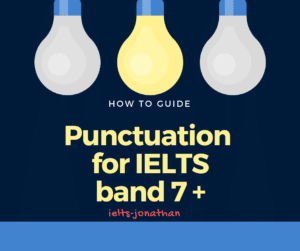One reason some candidates cannot achieve a band 6.5 or 7 in IELTS writing is because of faulty punctuation
When writing in English, it is common for students (and native speakers) to focus on using correct grammar and vocabulary.
Often, little attention is given to other features of writing such as punctuation.
Using punctuation correctly helps the Examiner follow and understand your message, in the same way that using pauses and intonation help when you’re speaking.
To show how important punctuation is, read the following sample Writing Task 2
Decide if the paragraph is easy or difficult to understand:
even though some people think that it is a family’s responsibility to pay for care for their aging family members i believe that the government should help to pay for this care this is because the elderly population has played a very important role in our society and they are the reason for our existence elderly people teach us values traditions and how to deal with life experiences therefore it is essential that all aging adults receive proper care even if their families don’t have the means to afford it
I imagine you had to re-read parts of the paragraph to understand the text.
There was no punctuation in the answer, resulting in a paragraph that is confusing and difficult to follow.
Add any punctuation to the paragraph that you think could help other readers to better understand the message.
Once you’ve finished, check your ideas with the original paragraph below.
Some of the most basic aspects of punctuation, such as starting a sentence with a capital letter and finishing it with a full stop, are pretty straightforward and easy to remember.
However, other punctuation uses are less obvious and require practice.
So I’ve created a guide to help you better understand when and how to use punctuation marks on your IELTS Writing test to improve your score:
Capital letters
Use capital letters:
- when starting a new sentence.
“This is because the elderly population has played a very important role in our society and they are the reason for our existence.”
- when using proper nouns and acronyms.
“Developed countries such as the UK and the US play a key role in the direction the world’s economy takes.”
Comma (,)
Use a comma:
- when separating items on a list.
“Elderly people teach us values, traditions and how to deal with life experiences.”
- before a coordinating conjunction (and, but, or, so, for, yet) that links two independent clauses.
“Scientists have been warning us about the effects of climate change for years, yet many people have chosen not to listen.”
- after an introductory phrase (including linking words, discourse markers and dependent clauses)
“In my opinion, parents are responsible for teaching their children values like kindness and compassion.”
- in conditional clauses when the if clause comes first.
“If all supermarkets charged a fee for the use of plastic bags, more people would be encouraged to bring their own reusable bags when shopping.”
- when providing additional information about a concept, to separate essential and non-essential information.
“The graph shows the amount of time that schoolchildren, who are between the ages of 6 and 12, spend on different home activities.”
Semi-colon (;)
Use a semi-colon:
- to join two independent clauses that share the same main idea.
“Immigration isn’t a black and white issue; it’s actually much more complicated than most people think.”
- in a list to separate objects that also have commas.
“The cities mentioned in the study include Paris, France; Athens, Greece; and Berlin, Germany.”
Colon (:)
Use a colon:
- to introduce a list of items.
“The process of making plastic products can be divided into three main stages: the production of long molecules from raw materials, the transformation from molecules to mould and the handling of the finished product.”
- to separate two independent clauses when the second clause explains or illustrates the first one.
“When faced with difficult situations, people always have two choices: run away or fight.”
Brackets ()
Use brackets:
- when including information that is not essential.
“The graphs below compare the average monthly earnings of male and female graduates in three different countries (Egypt, Brazil and New Zealand).”
There are other punctuation marks that you’re less likely to use on your IELTS, but that are also very important for your everyday writing:
- Interrogation mark (?): used when asking a direct question
- Exclamation mark (!): used when including someone else’s words in your writing
- Quotation marks (“): used when expressing strong emotions such as surprise or excitement
Keep in mind that one of the most effective ways to improve your use of punctuation is through reading.
Every time you read, pay attention to how punctuation is being used, especially when the writer is using punctuation you’re less familiar with.
The more you do this, the better able you will be to recognize and adopt appropriate uses of punctuation for your IELTS.
Please share to someone you know and in the meantime take a look at my Facebook Page and Website for IELTS answers and you can also join my Facebook Group here too.
Good Luck
All the Best,
Jonathan


